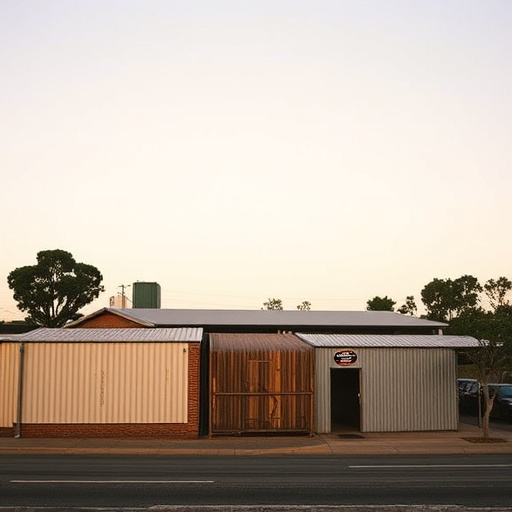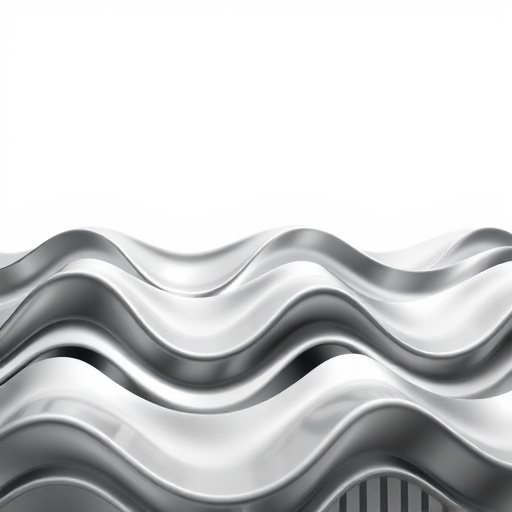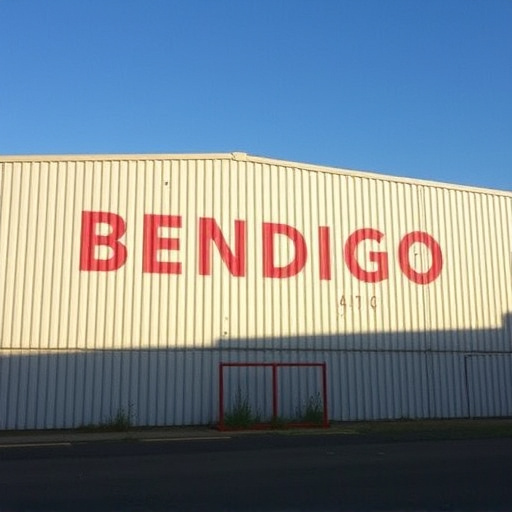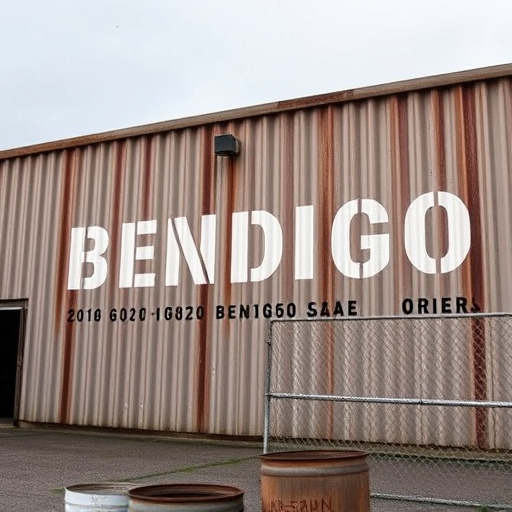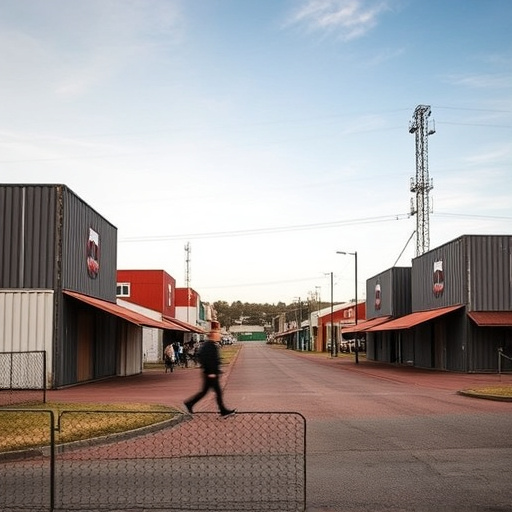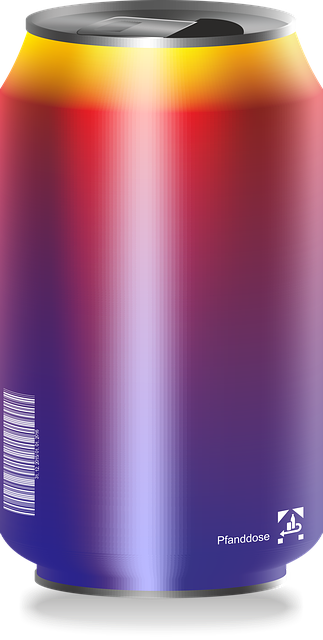Corrugated Bendigo: Unlocking the Potential of a Dynamic Urban Ecosystem
Introduction
Welcome to an in-depth exploration of a unique urban concept that has captured the imagination of planners, developers, and policymakers worldwide—Corrugated Bendigo. This innovative approach to urban development is transforming landscapes, fostering vibrant communities, and redefining sustainable living. In this comprehensive article, we will unravel the intricate layers of Corrugated Bendigo, its global impact, economic implications, technological innovations, and the challenges it faces. By delving into these aspects, we aim to provide a holistic understanding of this dynamic phenomenon and its potential to shape the cities of tomorrow.
Understanding Corrugated Bendigo: A Definition and Its Essence
Corrugated Bendigo, often simply referred to as ‘Corrugation’, is a groundbreaking urban development concept that involves structuring city landscapes in a corrugated or ridged manner, mimicking natural terrain. This method creates a dynamic urban tapestry where buildings, infrastructure, and public spaces are designed to follow the contours of the land, resulting in a distinctive, three-dimensional urban fabric. The core idea revolves around leveraging the natural elevation changes within an area to facilitate efficient land use, enhance accessibility, and promote sustainable development practices.
The concept draws inspiration from nature’s intricate patterns, where corrugated surfaces are not just aesthetic but serve functional purposes. In ecological systems, corrugations can aid in water drainage, heat circulation, and habitat diversity. Translating these principles into urban design allows for the creation of self-sufficient, resilient cities that adapt to their natural surroundings.
Global Impact and Trends: A Wave of Corrugated Innovation
The concept of Corrugated Bendigo has transcended borders, sparking interest and adoption across various regions, each adapting it to suit local contexts. This global trend can be attributed to several factors:
-
Sustainability Concerns: With a growing emphasis on sustainable urban development, Corrugation offers an eco-friendly alternative by promoting mixed-use zones, efficient transportation networks, and reduced environmental footprints.
-
Urban Congestion Mitigation: Many cities face congestion challenges due to dense populations. Corrugated landscapes can alleviate this by creating vertical access points, reducing traffic congestion, and enhancing connectivity between different areas.
-
Cultural and Aesthetic Appeal: The unique visual appeal of corrugated structures has captured the imagination of architects and designers worldwide. This aesthetic has led to iconic buildings and landmarks that have become symbols of modern urbanism.
Regional Adaptations:
-
Asia Pacific: Cities like Singapore and Tokyo have embraced Corrugation, incorporating it into their master plans to create vertical cities with efficient land use. The region’s compact nature and high population density make this concept particularly relevant.
-
Europe: European metropolises such as Berlin and Amsterdam have utilized Corrugated design to revitalize urban areas, promote cycling infrastructure, and enhance public spaces.
-
North America: In the US, cities like Los Angeles and New York have experimented with corrugated architecture, focusing on mixed-use developments and sustainable transportation solutions.
Economic Considerations: Market Dynamics and Opportunities
The economic implications of Corrugated Bendigo are multifaceted, impacting various sectors:
Market Dynamics:
- Real Estate: This concept can revolutionize the property market by offering diverse land use options, from residential to commercial. Flexible zoning regulations enable developers to create mixed-use projects, attracting investors seeking innovative opportunities.
- Infrastructure Development: Corrugated landscapes require specialized construction techniques and materials, fostering growth in the building and engineering sectors.
- Tourism: Unique architectural features can become tourist attractions, boosting local economies and promoting cultural exchange.
Investment Patterns:
- Public-Private Partnerships (PPPs): Governments often collaborate with private investors to implement Corrugated projects, leveraging each other’s strengths for successful development.
- Green Investments: The sustainable nature of Corrugation attracts environmentally conscious investors seeking long-term, impact-focused opportunities.
- Tech-Driven Ventures: Technological advancements in construction and design enable innovative funding models, such as blockchain-based real estate platforms.
Technological Advancements: Revolutionizing the Corrugated Landscape
Technology plays a pivotal role in bringing Corrugated Bendigo to life, enhancing its efficiency, sustainability, and aesthetics. Some notable technological innovations include:
- 3D Modeling and Simulation: Advanced 3D design software allows architects and engineers to create detailed models of corrugated structures, enabling virtual testing and visualization.
- Smart Materials: Researchers are developing intelligent materials that can adapt to environmental changes, improving energy efficiency and structural integrity.
- Drone Technology: Drones are being utilized for site surveying, construction monitoring, and even material delivery, enhancing project efficiency and safety.
- Internet of Things (IoT): IoT devices can be integrated into corrugated infrastructure to optimize energy usage, monitor air quality, and enhance overall urban performance.
Policy and Regulation: Shaping the Corrugated Urban Environment
The development and success of Corrugated Bendigo projects heavily rely on supportive policies and regulations. Governments play a crucial role in:
- Zoning and Land Use Planning: Flexible zoning laws are essential to accommodate the unique layout of corrugated developments, ensuring efficient land utilization.
- Environmental Guidelines: Implementing eco-friendly practices and sustainable development standards is vital to maintain the environmental integrity of Corrugated areas.
- Infrastructure Development: Governments often invest in transportation networks, green spaces, and public amenities to support these dynamic urban ecosystems.
- Tax Incentives: Tax breaks and subsidies can encourage developers and investors to embrace innovative concepts like Corrugation.
Challenges and Criticisms: Navigating the Rough Terrain
Despite its numerous advantages, Corrugated Bendigo faces several challenges that require careful consideration and strategic solutions:
- Topographical Limitations: Not all areas possess the natural variations necessary for effective corrugation. Overcoming site-specific constraints is a key challenge for developers.
- Cost of Development: Initial construction costs can be elevated due to specialized techniques and materials, potentially pricing out smaller developers or investors.
- Community Resistance: Changes in urban landscapes may face resistance from local residents, especially in culturally sensitive areas. Engaging communities in the planning process is essential.
- Maintenance Concerns: Unique structural designs may require specialized maintenance routines, posing challenges for property managers and facility teams.
Proposed Solutions:
- Contextual Design: Developers should adopt a design-sensitive approach, tailoring corrugated solutions to local topography and cultural contexts.
- Public Engagement: Involving communities in decision-making processes can foster acceptance and ensure projects align with local needs and aspirations.
- Partnerships and Incentives: Governments can offer incentives to developers who embrace sustainable practices and engage in community development initiatives.
- Standardized Maintenance Protocols: Creating industry standards for maintaining corrugated structures will ensure long-term integrity and reduce maintenance costs.
Case Studies: Real-World Success Stories
1. Sydney, Australia – The Corrugated Waterfront:
In Sydney, a prominent example is the transformation of the city’s waterfront into a vibrant, corrugated urban destination. The project involved building residential and commercial spaces along natural contours, creating a seamless blend of architecture and terrain. This development offered:
- Enhanced Water Access: Residents enjoy direct access to the water, promoting a maritime lifestyle.
- Sustainable Transport: Dedicated bike lanes and pedestrian paths encourage active transportation, reducing traffic congestion.
- Community Spaces: Public parks and open areas foster community interaction and provide green oases within the urban fabric.
2. Tokyo, Japan – The Vertical Corrugation:
Tokyo’s innovative ‘Vertical Corrugation’ project revolutionized a dense urban area by introducing vertical corrugations in building designs. This approach:
- Maximized Space Utilization: Tall, corrugated buildings with flexible zoning accommodate various functions while minimizing land use.
- Improved Connectivity: Elevated transport networks and vertical access points enhance mobility, reducing travel times.
- Cultural Hub: The project’s unique aesthetic has become a symbol of Tokyo’s modern identity, attracting tourists and fostering cultural events.
3. Copenhagen, Denmark – Cycling Paradise:
Copenhagen’s urban landscape embraces Corrugation to promote cycling as the primary mode of transportation. By incorporating natural elevation changes:
- Smooth Cycling Routes: The city’s intricate network of bike lanes connects various neighborhoods, encouraging residents and visitors to cycle.
- Reduced Traffic Congestion: Corrugated design allows for efficient traffic flow, minimizing the need for extensive road networks.
- Green Infrastructure: Bike paths are often accompanied by lush green spaces, creating a harmonious urban-natural balance.
Future Prospects: Embracing Emerging Trends and Strategic Considerations
As we peer into the future of Corrugated Bendigo, several trends and strategic directions emerge:
- Smart Cities Integration: Advanced technologies will play a pivotal role in creating smart corrugated cities, where data-driven insights optimize urban operations and enhance citizen services.
- Micro-Mobility Expansion: The rise of electric scooters and bikes will complement existing cycling infrastructure, offering efficient last-mile connectivity.
- Green Corrugation: Emphasizing sustainable practices, future projects may incorporate renewable energy sources, green building materials, and circular economy principles.
- Community Co-Creation: Engaging communities in the co-creation of urban spaces will foster a sense of ownership and ensure developed solutions meet local needs.
- Global Knowledge Sharing: As Corrugation gains traction worldwide, knowledge-sharing platforms and collaborations will enable cities to learn from each other’s successes and challenges.
Conclusion: Unlocking the Future of Urban Living
Corrugated Bendigo represents a paradigm shift in urban development, offering a dynamic, sustainable, and resilient approach to shaping our cities. By harnessing nature’s inspiration, this concept provides solutions to pressing urban challenges while fostering vibrant communities and promoting environmental stewardship. As we navigate the future, the global community has an opportunity to embrace Corrugation as a catalyst for transformative urban change, ensuring that our cities thrive in harmony with their natural surroundings.
FAQ Section: Answering Common Queries
Q: What makes Corrugated Bendigo unique compared to traditional urban planning?
A: Corrugated Bendigo stands out by incorporating natural terrain into urban design, creating a three-dimensional landscape. This approach contrasts with conventional flat urban plans, offering more efficient land use and enhanced accessibility.
Q: How does Corrugation impact water management in urban areas?
A: The corrugated nature of the landscapes can facilitate better drainage systems, reducing flooding risks. Natural contours direct water flow efficiently, supporting sustainable hydrological practices.
Q: Can you provide examples of materials used in Corrugated building construction?
A: Developers often utilize advanced composite materials, steel, and concrete to build corrugated structures. These materials are designed to withstand unique structural stresses, ensuring longevity and safety.
Q: What role do local communities play in Corrugated development projects?
A: Community engagement is vital. Local residents can provide valuable insights into site-specific needs, cultural considerations, and potential impacts. Their involvement ensures projects are inclusive and aligned with the area’s identity.
Q: Are there any notable challenges faced during the construction of Corrugated buildings?
A: Yes, unique design requirements may lead to longer construction times and elevated costs. Specialized techniques also demand skilled labor, which can be a challenge in certain regions. However, these obstacles are surmountable with careful planning and industry collaboration.
Steeline Roofing Centre Bendigo offers high-quality corrugated iron sheets at competitive rates, backed by the Steeline brand's durability and strength guarantees. Local experts provide tailored solutions for both contractors and homeowners…….
Continue Reading
Steeline Roofing Centre Bendigo offers high-quality, durable corrugated iron cladding for residential and commercial projects. With a range of profiles, finishes, and colours, their custom panels enhance structural integrity while withstanding e…….
Continue Reading
Corrugated Bendigo products, offered by Steeline Roofing Centre Bendigo, are versatile and indispensable in modern industry. With a diverse range of finishes from plain to printed, coated to uncoated, they cater to various needs – from hig…….
Continue Reading
Steelee Roofing Centre Bendigo is a leading supplier of high-performance corrugated iron and steel fencing solutions. They offer a wide range of durable, aesthetically pleasing products that cater to various styles and preferences. With an empha…….
Continue Reading
Corrugated steel, known for its strength, affordability, and versatility, is a preferred choice in Bendigo and beyond. Steeline Roofing Centre Bendigo specializes in high-quality corrugated solutions, catering to both residential and commercial…….
Continue Reading
Steeline Roofing Centre Bendigo offers durable and aesthetically pleasing corrugated metal fencing solutions tailored to both residential and commercial properties in Corrugated Bendigo. Their high-quality products, expert guidance, and straight…….
Continue Reading
Steeline Roofing Centre Bendigo is a leading supplier of high-quality corrugated construction materials for both professionals and DIYers in Victoria, Australia. They offer durable roofing solutions with exceptional structural integrity, suitabl…….
Continue Reading
Steeline Roofing Bendigo: Unlocking the Power of Corrugated Steel in Your ProjectCorrugated steel has emerged as a game-changer in the roofing industry, and Steeline Roofing Bendigo is at the forefront of this revolution. With an extensive range…….
Continue Reading
Steeline Roofing Centre Bendigo is a leading supplier of corrugated products in the region, offering high-quality materials for both residential and commercial roofing. Strategically located at 6 Harrien Ct, Epsom VIC 3551, Australia, they provi…….
Continue Reading
Steeline Roofing Centre Bendigo is a trusted local provider of high-quality corrugated roof panels, serving Epsom, VIC, and beyond. With years of experience, their expert team offers tailored solutions for unique roofs, catering to both homeowne…….
Continue Reading
Steeline Roofing Centre Bendigo is a reliable provider of high-quality corrugated steel roofing solutions for both residential and commercial projects. Located at 6 Harrien Ct, Epsom VIC 3551, Australia, they offer a wide range of durable, cost-…….
Continue Reading
Steeline Bendigo, located at 6 Harrien Ct, Epsom VIC 3551, Australia, is a leading provider of high-quality corrugated roofing solutions for both residential and commercial projects. Their durable, aesthetically pleasing, and easy-to-install pro…….
Continue Reading
Corrugated panels have become a popular choice in Bendigo due to their durability, affordability, and attractive design. Steeline Roofing Centre Bendigo is a leading provider of corrugated materials, offering an extensive range of affordable, hi…….
Continue Reading
Steeline Roofing Centre Bendigo is your local supplier for high-quality corrugated construction materials, catering to both residential and commercial projects. Located at 6 Harrien Ct, Epsom VIC 3551, Australia, they offer an extensive inventor…….
Continue Reading
Steeline Roofing Centre Bendigo, located at 6 Harrien Ct, Epsom VIC 3551, Australia, offers a comprehensive selection of high-quality corrugated steel sheets for commercial and residential projects. Their knowledgeable staff assists in choosing…….
Continue Reading
Steeline Roofing Centre Bendigo, located at 6 Harrien Ct, Epsom VIC 3551, Australia, is a leading supplier of high-quality corrugated roofing materials. They offer a diverse range of products, expert advice, and excellent service to meet various…….
Continue Reading
Corrugated metal, known for its strength and durability, is a versatile material ideal for roofing, construction, and various structural applications. Steeline Roofing Centre in Bendigo, Australia (6 Harrien Ct, Epsom VIC 3551), offers high-qual…….
Continue Reading
Corrugated iron cladding, a robust and adaptable material, is a top choice for building projects in Bendigo and nearby areas, thanks to its high strength-to-weight ratio, durability against corrosion, and weather resistance. Steeline Bendigo Cen…….
Continue Reading
